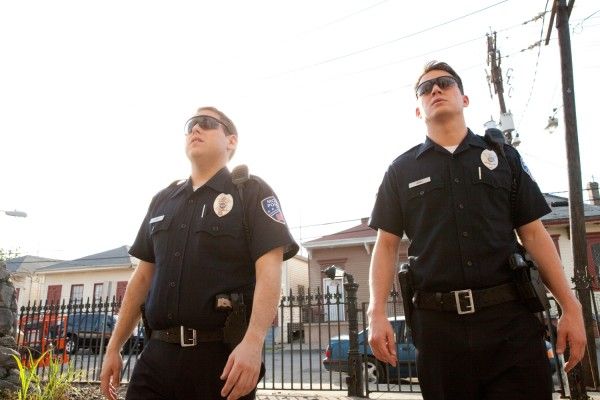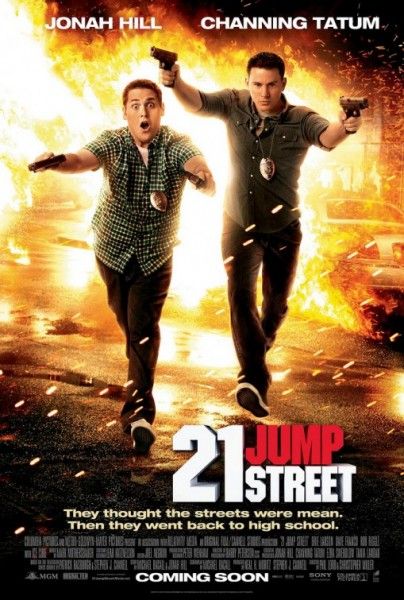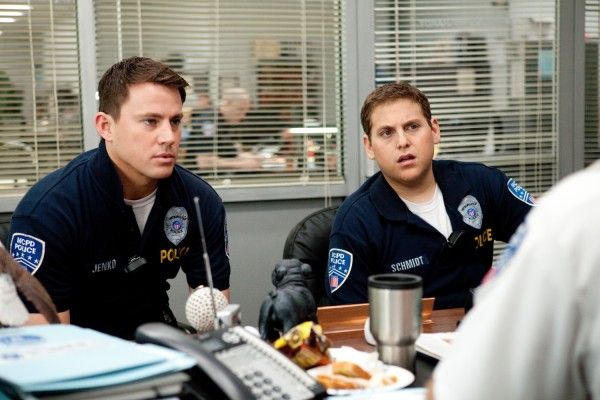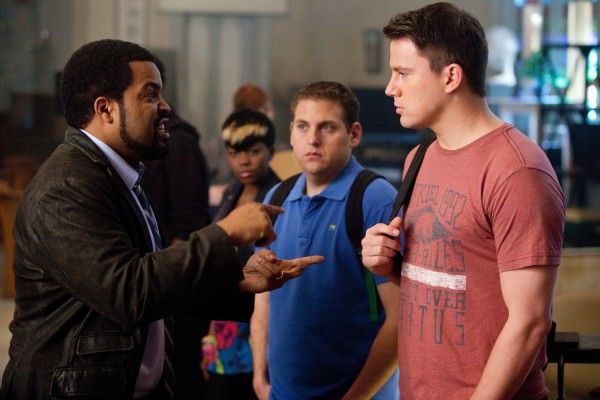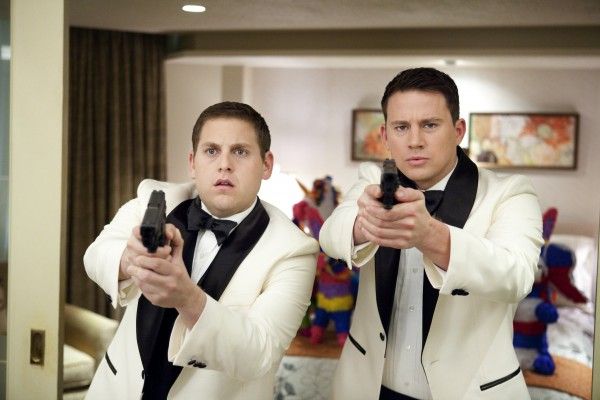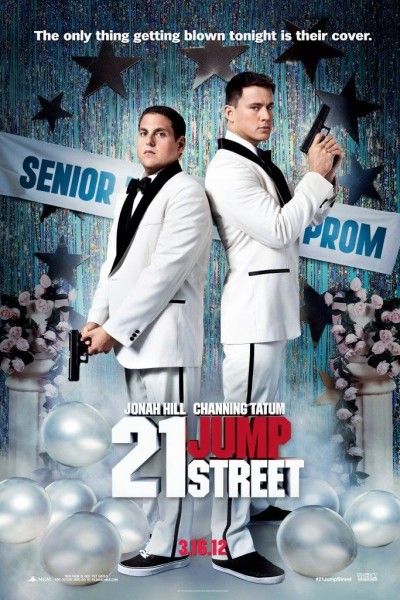Neal Moritz is the go-to producer for action movies these days. In just the first half of 2011, he released The Green Hornet, Battle: Los Angeles, and Fast Five, which together grossed more than $1 billion worldwide. In remaking the 1980s TV show 21 Jump Street, Moritz lends so much credibility to the action side of this action-comedy.
A group of us movie bloggers had the chance to interview Moritz on set in New Orleans near the end of the shoot. He talked about the approach to adapting the show, the promise he saw in directors Phil Lord and Chris Miller (this is their first live-action feature), how he got "25% more on the screen" by shooting in New Orleans, plus what Channing Tatum and Jonah Hill brought to the project as actor/producers. Read what he had to say after the jump.
One note: Right before the interview, Moritz showed us a slideshow of stills from the film. What we saw is referenced a few times.
NEAL MORITZ: We've tried to embrace the old series. And we've also tried to make this new and original even though it is based on an old TV show, a beloved TV show from Stephen Cannell, who was great friend of ours. I was very sorry that he passed away and he wasn't able to be here because this was a passion project. He brought me into the project originally. I really, really like him, and I'm really sad that he's not around, to be honest.
The original show wasn't a comedy, but looking at that, you have some great comedic actors.
MORITZ: We've really tried to make this an action-comedy, not just a comedy and not just an action film. There are winks to the original show, but what I like so much about the original show is just the concept of young people who have to go undercover in high school. And our situation, what we've done is we've taken it a step further. Jonah had a terrible time in high school, and Channing a good time in high school but not with a good ending. So now here are guys who think they have the almanac, how it's going to be so easy to go back to high school a second time. It's going to be so easy for them, they know all the rules. And what they realize is it's even harder the second time. What happens is, their personal lives and professional lives are at odds during this case the entire time because... For instance, Jonah's character really wants to be cool, and it's not as easy, and it gets in the way of his police case. So we were always trying to put our personal stories in the way of our police case that our guys are involved with as well.
Talk about that both with this and The Green Hornet, picking unconventional projects. Projects that people aren't like, "I definitely want to see a movie of that." And then finding people to adapt them into films that are unexpected choices.
MORITZ: Yeah, you know, originally were developing this as the straight version of the show. When Jonah came to me with this idea, I was like, "You know what? That's probably the way to go." And then when we got a first draft of the screenplay, I was really, really, like, "Okay, we're going to make this movie." Just because I liked the fresh spin on it, and I thought it was an original take. And the movie could have existed if there was no 21 Jump Street show. That's what I liked. I think the combination of action and the combination of comedy are two really, really good genres to meld together. Some of the best buddy cop movies, whether it's 48 Hrs. or Lethal Weapon, have had a combination of those two. I really like those kind of movies.
As a producer, were there any lessons that you learned from either the reception or success of The Green Hornet?
MORITZ: What I learned through Green Hornet was the funnier we made it, the better the audiences liked it. And so on this movie, I really, really... Obviously I've been very successful, luckily, with action movies, with the Fast and Furious franchise, and XXX, and S.W.A.T., and a lot of other action movies that were pure action movies. I learned that in these movies, you can't just have action for action's sake. The action has to either be funny, or it has to really move the story forward, or the relationships forward. So we have always pushed... Luckily the directors of this movie and the stars of this movie know comedy a lot better than I do. I've just been saying, "Go for it, go for it. Keep pushing it. Let's go as far as we can." I'm not used to ad-libbing on the set, honestly. Green Hornet we did quite a bit, but on my other movies we did very little ad-libbing on the set. And on both Green Hornet and on this movie, there's been quite a bit of ad-libbing. You know, even if you get one great joke, it's worth it.
What made you guys want to shoot it here in Louisiana?
MORITZ: Well, we shot in Louisiana... One, the tax breaks here are great, which helped us get a lot more on the screen. It probably gets me 25% more on the screen. It also just fit the environment of what we were going for. In the original show, it's called Metropolitan City, and kind of was anywhere. This city has afforded us a tremendous amount of locations and things like shutting down the freeway for five, six days. I can't do that in LA. I can't do it. Here, they let us do it. And they've let us do a lot of things so that it's been a very, very cooperative place to shoot.
In the original show, there was a group of teenage-looking cops. Why did you guys decide to go with two main players versus a bunch of people?
MORITZ: We have other members of Jump Street that are off doing their own things. When we go back to the scenes with Ice Cube, those people are in those scenes. But what we decided was we wanted to do more of a buddy movie with these two guys, using that seed of people going undercover in high school.
That school play was Peter Pan, wasn't it?
MORITZ: Yes it was.
Is there any continuity with the series at all?
MORITZ: Yes. And it involves the cameo that I can't talk about. But there's a very, very, very clever way it's used. Honestly, I think the only reason that person agreed to do it is because it was a very clever twist on going back to the original. Really clever, actually.
Do you feel that for younger people who might not have watched the show that they can jump into this movie?
MORITZ: Yes, 100%. This movie is about two young guys who don't get respect as cops, and now have to go back into high school where they think they're going to be the big men. And they turn out to know high school less than any incoming freshman. They are just out of date, and there's a lot of fun in that.
Are we getting high school flashbacks so we can see what they were like in high school?
MORITZ: We open the movie at the very beginning with them in high school. And they're not friends when they're in high school. So it's not until they graduate high school and both go into the police academy that one realizes that each one can help them. That's the metamorphosis of their friendship.
Can you give us some background on that the scene that we just watched?
MORITZ: That's a scene where what our guys know is that the cool kids are somehow involved in the bad guy plot. They don't know how yet, but they know there's someone involved. And the cool guys in our school are way different than the cool guys I knew when I was at school. They're eco-friendly, Berkley-going, they actually care. So we've taken a big twist on it. They care about the environment. It's exactly what you would not expect cool kids, or what I grew up with the cool kids were. So our guys have had a hard time getting in with them. Their mission is get in, get close to these cool kids, figure out how they're involved. But they're having a really hard time. And now something that just happened in the movie in the scene prior to this where our guys think they have totally fucked up actually turns out to be the thing that lets them in. Because these guys say to them, "That was great, you screwed up that organized sports thing. Organized sports are fascist." So it's a twist on that. Whereas Jonah thought that he'd be able to win the race and that would get him in with the cool kids. But in reality, he totally screwed it up, and that was the thing that got him in with the cool kids.
Will you be using the original theme song for the movie?
MORITZ: There's a good possibility.
The soundtrack in general, we heard early 90s songs.
MORITZ: That was just something that we threw on there. We have some party scenes where we have different songs, and you can talk to the directors more on the music. Obviously, we've got another week or so of filming, and then we'll get into that.
Are these original characters in this movie, or are they new iterations of characters who are from the show?
MORITZ: They are... you know, I don't want to talk about that. There's other reasons, but okay. Go ahead, I'm sorry.
Do you feel like the storyline with the drugs, do you know why it was drugs specifically?
MORITZ: The drugs have very, very little to do with this, and we have a funny take on the drugs. The drugs are called HFS, which means "Holy Fucking Shit." So everything we are doing has a tinge of comedy to it. It's not like they're selling cocaine. It's a designer drug and the reason the drug is so addictive is because they add a little bit of Doritos flavoring in it, and that's what makes it so addictive. So there's a little fun with all of it.
You have Rob Riggle and DeRay Davis. Those are the bad guys in this movie. Are they comical bad guys?
MORITZ: No, I don't really think that... I think you can be comical, but I think you have to be a real threat. I don't think you can be goofy bad guys, or at least in the movies that I like. There's comedy with all of them, they all have their eccentricities about them, and they're kind of strange. But they're not just goofy bad guys. There is a real threat to them. And I think that in certain scenes in the movie, if we didn't have that, those scenes that just don't work. You don't feel a threat, you don't care necessarily if our characters get in or out of the situation.
So when you cast guys like that, do you go, "We really want you to bring some comedic element, but what we really need from you is a serious, palpable threat."?
MORITZ: Well, the good thing about Riggle is he's a comedian, but he was also a Marine, a lieutenant colonel. And he's big in stature. So you get both. Same with DeRay. He's intimidating, but he's also going to be funny. That's what we were looking for, people that can be intimidating, but also can be funny.
How long was the movie in pre-production, and how long has it taken to put this together?
MORITZ: It's probably taken five years. Originally it was at Paramount, and when we developed it at Paramount it was much more the straight ahead version. Then it left Paramount, and I brought it to Sony. And then we started this new take with Jonah probably about three years ago.
Has anyone from the production in the original show been involved?
MORITZ: Stephen Cannell was involved the whole time until he passed away unfortunately.
How early did you know this material needed to be R-rated. And was there any fight about the rating?
MORITZ: There was never a fight. Once Jonah came and talked to me about his take, we knew it was going to be R-rated. We wanted it to feel real, and I wanted that feeling.
What was it about Chris and Phil's interpretation, or their pitch, that made them the right guys?
MORITZ: I liked their movie that they made, [Cloudy with a Chance of Meatballs]. But more importantly, talked to us about the movie, talked about the things that were working, that weren't working in the script. And then they did a visual presentation that captured a "nowness" to it, as to why it should exist. The look that they were going for was something that I was very interested in. And I thought they could give a good, fresh, young voice to a movie that I felt really needed that.
Was there any concern about the fact that their previous movie was animated?
MORITZ: I've done so many movies with first-time directors, and honestly I just go with gut instinct. People that usually can tell me a good story, and talk to me about why the movie is the movie they want to make. I just go with my gut. And it's paid off. They've done a very good job.
How far can you go with the comedy? From the stills, it's hard to tell. You can see Jonah running down the street.
MORITZ: We go pretty far, but we always tried to stay within a reality. Whenever it got too broad or too silly, or didn't fit in the world we were trying to create, we just said no. We can't go that far. There was one still you saw, Channing, he's literally laying in the fountain right out here. We shot it this morning. It was really funny. The idea was he had taken this HFS because the bad guys, the bad kid says, "Hey, you guys are narcs." The first thing these guys are told is, "You can't throw a party. You can't take drugs. You can't get underage girls." And they break every rule. But they do it all to break the case. So there is a still there of Channing literally laying in the fountain. He had taken HFS during the school day, because the bad kid said, "You either take it or you're a narc." And they have no choice, they take it. And this drug, it just makes you pass out. So he was passed out in the fountain out here this morning.
There's a big shift in technology between when the series was on and now. Is that played up at all?
MORITZ: What's played up is, we're shooting the movie digitally. This is the first time I've ever shot a movie completely digitally, and I've liked it so much. We just started Total Recall a couple weeks ago and we're shooting that digitally now as well. I really, really like it.
I mean in the world of the film. Do cell phones play a big role?
MORITZ: Yes, there's that kind of stuff. But I wouldn't say this movie that's high in technology. It's more a good old fashioned "cops going into high school" movie.
Back in the day, you could slip into a high school. But now, if you don't have a Facebook, people are going to question you. How did you deal with that?
MORITZ: We created all these backstories for these characters, and Facebook pages, and all this stuff. That was created as a cover story for all of them.
We didn't have to deal with that.
MORITZ: Exactly. And one of our characters takes it seriously, trying to really understand the biography that was created for him. And the other one, Channing, doesn't take it seriously at all, and it creates a big problem for them. When they arrive at school, they end up getting each other's class schedule because Channing can't remember which name he was. So we've really tried to, in each scene, infuse the character in each of these scenes, in each of these complications that arise.
So Channing's character is sort of the dumb jock?
MORITZ: Yes. And Jonah was the nerd.
How much effort did you guys put into finding the right balance of making these guys look like they're old enough to be at a school, and then also could fit in? Because you look at the old 21 Jump Street, and it's like Johnny Depp and Richard Grieco, those guys were all like 27 years old. Even the high school characters looked 27 years old.
MORITZ: We put effort into that, and what we realized is when we started casting extras for the movie, high school kids... Some look really young, and some look older. Some have gone through puberty, some have not. There's a wide range. In these scenes that we've been shooting, our guys never stick out as guys who are older than the regular... I mean, maybe a little bit. We actually have fun with that, too. We decided that Channing has flunked three years of high school. So we always have a way to deal with that.
Was anyone from the production a fan of the original show?
MORITZ: I think we were all fans of it in a strange way. Especially, I was. I'm one of the older guys involved in the movie. I think the fact that Johnny Depp was in that original show, that once Johnny Depp became popular, people went back and watched those shows. It was a very, very popular show at the time.
Can you talk about Jonah's original pitch to you and what immediately sold you?
MORITZ: What immediately sold it to me... I really liked the idea of kids who had a bad high school experience getting to relive it. I really liked that idea. I thought that was relatable. I think that everybody, even if they had the best high school experience, there was something about high school. Whether you dropped a pass, or whether you flunked the test, or you didn't go to the prom. I think there was always something that everybody wishes they could relive in high school. And I really like coming from a character point of view versus a plot point of view of young-looking cops going into high school. I liked it that there was a backstory of their high school experience that they wanted to improve. I thought that was good. And I liked the action-comedy version that he pitched.
Would you say there's a moral to the movie, or a lesson to be learned?
MORITZ: Be yourself. Be yourself. Be yourself.
Have there been any challenges shooting here in the high school or in Louisiana?
MORITZ: The only thing that was challenging was we couldn't shoot in the high school as much as we would have wanted while the schools were in session. So that's why we're here towards the end once the schools got out. But honestly, that has not been an issue for us. We found incredible locations. Our city is called Metropolitan City. Nobody will know that we shot it in Louisiana. It looks like some urban city somewhere.
Was the decision to keep it anonymous?
MORITZ: Yes. The original was set in Metropolitan City, so we wanted to do this.
What is the action side of the action-comedy? Are there stunts, or anything that---
MORITZ: There is a lot of action in this movie. Probably that's where I came in the most handy. I've done a tremendous amount of action movies. Between the guys and myself and George Aguilar, who did second unit for us, we've put together two great action sequences. One is a freeway chase which is done with great action, but with comedy. And then one is at the end, that involves the prom, which is a big chase through the prom in limos to the end. You saw some of the pictures, which involve limos and prom people. It's still infused with comedy, action that's infused with comedy.
As far as the female characters in the movie, like Ellie and Brie's characters---
MORITZ: Brie Larson plays a girl in high school who hangs out with the cool kids. She's not involved with the bad guy plot by any means. But it's a much more laissez faire attitude in high school where she could be hooking up with Dave Franco, but it doesn't mean they're boyfriend/girlfriend. So that confuses Jonah in a way. It's like, "I don't understand it." Jonah has the hots for her, but obviously she's not of legal age. She's in high school. He shouldn't be with her. So there's that whole conflict that arises there.
As far as finding the pair at the center, obviously Jonah's involved at the screenwriting end, so he was there. Was Channing someone that you had in mind for a while?
MORITZ: Channing was our number one choice of who we wanted to pair. I really wanted a very distinct, different coupling. And I'm a huge fan of Channing's. I've been a fan of him since before he did Step Up. I met him, and I've offered him many movies. I've tried to get in business with him many times. And we went to him, and we offered it to him. Then we all had dinner together, and we saw the chemistry between those two guys. Then we really pursued him, and he agreed to do it. And they've been great together. Channing likes to say he's not so great at comedy, but he's really good at comedy. He was really good. And he was able to go toe to toe with Jonah in the improv. It was great.
He's just starting to get into producing.
MORITZ: Yes he is. He and Jonah are both executive producers on the movie.
So what do they bring as actor/producers?
MORITZ: They brought a lot into the development of the script, and really helping us define their characters much more fully than they were in the original script. They're young, and they're a good source for like, "This is going to work with young people, this is not going to work with young people." There were a lot of conversations that went back and forth between all of us, and their point of view was very helpful.
---
For more coverage from the set:

